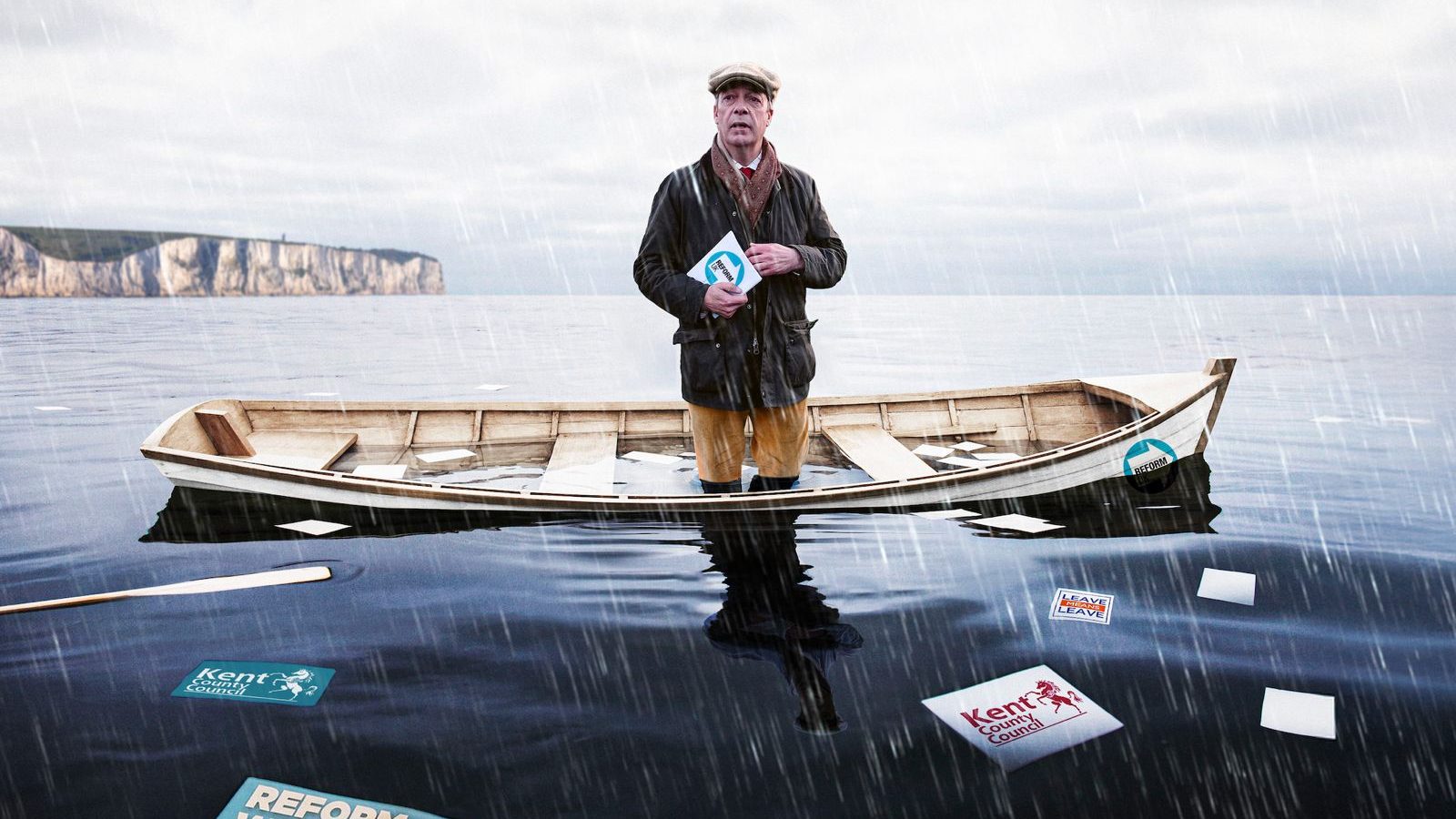Re: the Inside the Mind of a 16-Year-Old issue (TNW #459):
It’s very worrying that, according to Peter Hyman and Shuab Gamote’s article, so many young people admire Farage and Trump. Trump won partly because Joe Biden was so hapless, and because the young and anyone else with any moral compass and revulsion towards a genocide couldn’t bring themselves to vote for Kamala Harris. Farage will probably win here for the same reasons.
Richard Riddle
“What 16-year-olds think… for the first time they’ll be able to vote at the next election”.
In Scotland, 16-year-olds have been voting in Scottish government elections since 2016, and referendums since 2014.
They will, in addition, be voting in the next general election to send MPs to the government in London.
Douglas Young
Ferryden, Scotland
Re: Alastair Campbell’s diary on the BBC (TNW #459)
Hospital pass I know, but would Alastair be up for the director-general job? I think he’d be rather good and the Mail would love him.
Christopher Harrison
For the Beeb to be accused of bias by Trump, the Telegraph, Charles Moore, the Mail and all the other usual suspects is the grossest hypocrisy imaginable.
Alexander Blackburn
Re: “Nick Fuentes, American Nazi” by Matthew d’Ancona (TNW #459)
A frightening article. I often think, though, that the misogyny of these people is brushed over. The antisemitism is indeed worrying, but let’s also not forget that it’s not uncommon now to hear men on the American far right promoting rape, advocating that women remain in their homes, lose the vote, withdraw from the world, basically shut the f*ck up and churn out babies.
An American Taliban is looming. It’s not a mainstream view yet, but that is the direction of travel here.
They’ve already achieved the overturning of Roe v Wade.
Nicola Fielder
Fuentes is a monster in plain sight. But then the MAGA Trump administration makes strategic use of the unhinged, so why would Fuentes be any different?
Ann Shilcock
Re: “The rebirth of hope” by Marie Le Conte (TNW #459)
While celebrating Zohran Mamdani, we need to be giving our own young charismatic progressive leader more airtime. Zach Polanski is a less loud, more British version and his policies resonate so strongly with those who call themselves progressive.
I know it’s early days, but he deserves to be supported for his pro-European, anti-billionaire, affordable housing and NHS-
supporting agenda. And, of course, there is the most unsung existential crisis – the climate!
D David
Re: “Farage and the moron premium” by Paul Mason (TNW #459)
I agree with the writer – for Reform to win upwards of 325 seats in an election still several years away seems to me to be complete fantasy.
Before anyone suggests it, this is not complacency. Just consider Farage’s own track record, his new party’s rapidly emerging record of crass incompetence and division (not to mention breathtaking out-and-out racism) and, as happened in Caerphilly, the likely impact of tactical voting should a serious threat still exist from the far right in three years’ time.
John Hyder-Wilson
France has a similar-sized economy to the UK, and a higher government debt, but a well-funded social welfare system that still operates well. The country pays some 3.5% to service its debt. Britain on the other hand, after many rounds of austerity, and a welfare state in crisis, pays around 4.5% on its government bonds.
Why the difference? Partially because France took the sensible decision to join the Euro, but also because after Britain left the EU, the country has been considered a comparably dodgy place to invest your money. That is why UK government borrowing over the last six months cost the country some £100bn.
If it was paying the interest rate France pays on its gilts, that would have been reduced by a quarter. The chancellor would have had maybe £50bn more to spend on hospitals, on welfare, and on other good things next year. Why is this so little reported?
Roger Nelson
The government doesn’t need to borrow to fund its spending. It doesn’t rely on taxes either. The bond market will still want a secure long-term place to save, and that is UK government pounds.
This is why the UK is screwed – all economic arguments are through the neo-liberal ideological lens. We have to break this, and this paper should start. Invite Professor Stephanie Kelton, Steve Keen or Richard Murphy for an interview and get a different perspective.
Russell Sage
Re: Everyday Philosophy on limitarianism (TNW #459).
I’ve no quarrel with the idea that there ought to be limits on personal wealth, but my question is what happens to the wealth if it doesn’t flow to lucky individuals? Most, if not all of the tech bros’ wealth arises from consumers flocking to buy their products. If Musk or Bezos aren’t to possess it, what then?
Ought the products’ prices be lower? Should governments tax it away?
Mark Scott
I agree with Nigel Warburton: The super-rich are just super-lucky. However, in one way they are progressing to being very unlucky: they cannot realistically spend such wealth and neither can they take it with them. The realisation and mental anguish must mount up year on year. As my late father said: “There is no virtue in being the richest man in the cemetery.”
Robert Boston
Re: Heart of the machine, by Jeremy Blackmore (TNW #459)
Much as I still love Kraftwerk – and I’m going to see them at the Albert Hall yet again next year – the magic departed years ago. It’s an awesome visual and sonic show, but knowing exactly what they’ll play, in exactly what order, and in exactly which way, is tedious and humourless.
Ralf Hütter’s vision became a straitjacket from which he was incapable of escape. The subsequent albums made by Wolfgang Flür and Karl Bartos show what Kraftwerk could have evolved into had Hütter been capable of even a scintilla of flexibility.
The final paragraphs, about meeting Florian in a restaurant, are so sad – yes, he was the funny guy, you sensed that beneath the mask he was required to wear by Hütter.
Andrew Shields
Suggested Reading

Inside the mind of a 16-year-old
Below the line
Re: Rats in a Sack on Lord Frost (TNW #459)
There was an unfortunate typo in the first sentence – instead of calling the IEA a “right wing, climate change-sceptic think tank”, surely it should have read “right wing, climate change septic tank”?
David Irwin
Re: Peter Trudgill on nominative determinism (TNW #458) In my father’s class at school there was a Pope and a Bishop, a Castle, a Knight (and a Day) – almost the entire chessboard. But my father was a King. Good fortune followed, naturally.
John King
I was working at New Scientist around the time the concept of nominative determinism arose. The first instance (submitted by a reader) was of an academic paper discussing urinary tract problems written by two American researchers called Splatt and Weedon. The column’s editor, John Hoyland, embraced the idea and featured it for years, though he never claimed to have coined the term. In fact, the week the Splatt and Weedon item appeared, John was on holiday and a freelance, Mike Holderness, was standing in. Many years later, Mike told me that the reader who submitted the story was the one who actually came up with the term “nominative determinism”
Mick O’Hare



